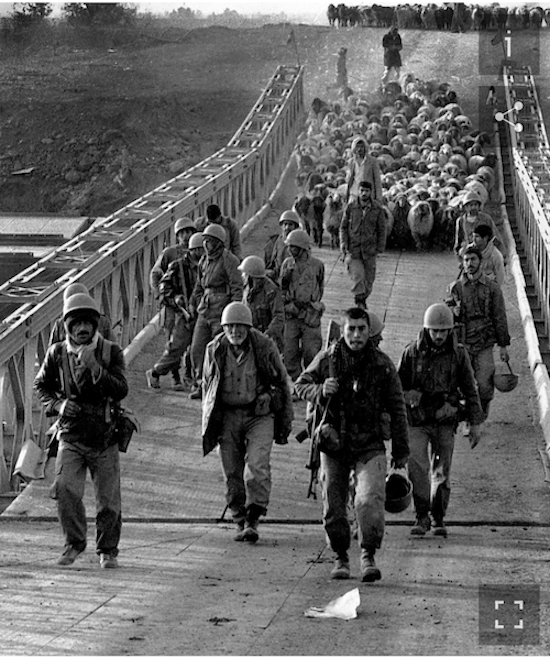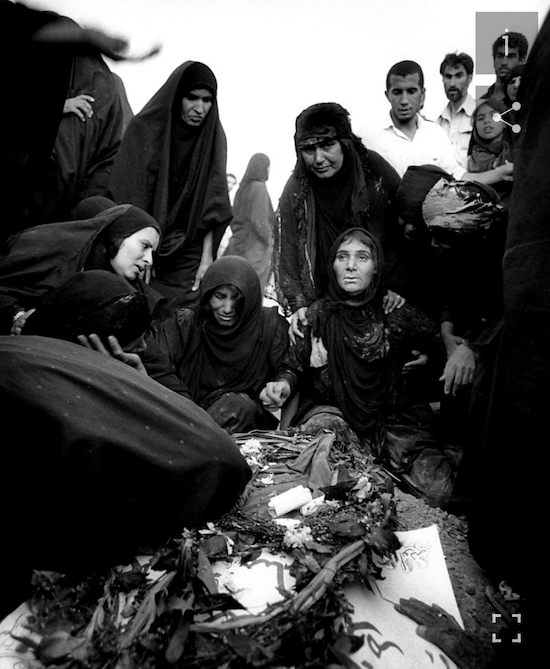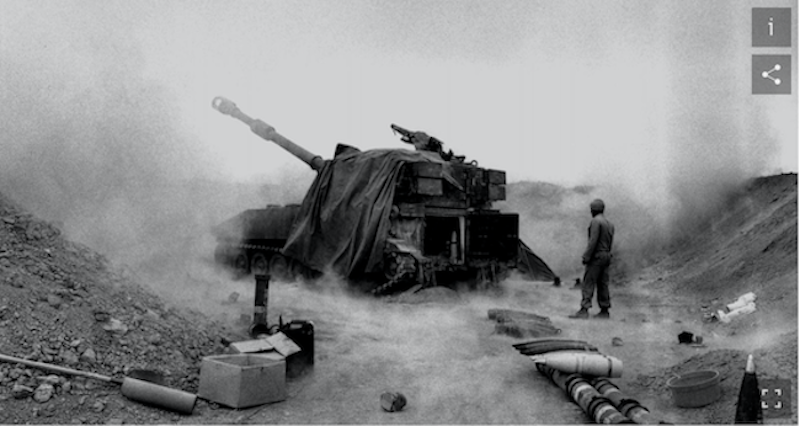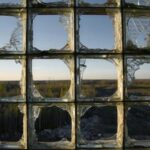Editor’s Note: This excerpt from Self-Portrait in Bloom is set in Tehran, Iran, during the Iran-Iraq war that lasted from 1980-1988. The Shamlous referred to here are the iconic Iranian poet Ahmad Shamlou (1925-2000) and his wife Aida.
Photograph permission has been very generously granted to Niloufar Talebi and Consequence by Alfred Yaghobzadeh, author of Iran-Iraq War.
“The Shamlous visited us first at the small apartment in the complex of tall, sooty buildings whose main attraction to us kids was what seemed like an Olympic-sized swimming pool next to a large and shallow kids’ pool, and later at the white-colored house my parents built, their dream home we abandoned only two years later to emigrate in 1984. The first apartment was walking distance to my father’s clinic, a walk my mother and I made many times through sleepy side streets either to meet my father, which mostly turned into a fun eye doctor’s appointment for me as I explored every inch of what seemed like a vast room, with a desk area, an eye exam area, and an adjoining room for contact lens fittings, or for one of us to be examined for some illness by a colleague on a different floor, as I was an often-sick child, perhaps a byproduct of ultra-clean mothering and the frequent and abundant access to antibiotics at any sign of a cold, or some such reason. We could see the crosses on the steeples of the Armenian church, Saint Sarkis, right at the center of Tehran. The second home was the white, Greco-Roman-style one-story house my parents built on the parcel of land they had purchased at a new development on the western outskirts of Tehran, the construction of which was the subject of endless nihilistic speculation as to whether their nest egg should be spent on a property in a country whose present was one unexpected and shocking charade after another, and whose future was uncertain, if not outright bleak.

We also visited the Shamlous’ apartment in Tehran. It was here that I first encountered artichokes, in the form of hearts brined in vinegar. The precious few of them served in a little bowl seemed so exotic and Western, as if they were not to be eaten, as if they must have cost a hefty sum on the black market that gave my family access to Corn Flakes, peanut butter, and other Western foods. But artichokes I had never seen. I chalked up the canned hearts to Aida’s Christian Armenian background. But I wonder now whether it had more to do with exposure through their travels abroad, which somehow my own travels had not furnished me with.
On the tour of the apartment, we were shown Shamlou’s office, his writing sanctuary, with a small desk, and small pieces of paper, called fiche, with little notes. Now I know those were entries for the Book of the Alley, the living compendium of folklore Shamlou had begun gathering early on in his life—but had abandoned many times after the manuscripts were confiscated in raids, burned, lost—which went through fits and starts before he resumed gathering for the third time in 1965.
On one occasion, Shamlou played Tchaikovsky’s 1812 Overture, a piece depicting and commemorating Russia’s defense of its motherland against Napoleon’s invasion in 1812. The piece ends with five explosive cannon shots to counter a fragment of “La Marseillaise,” the French national anthem, and climaxes in a volley of thundering with eleven more precisely scored shots, chimes, and brass fanfare such that it is a common accompaniment to fireworks displays.
In the middle of the final fanfare, their intercom rang. Shamlou answered. On the other end was a frantic neighbor pleading that they stop the music. It was too close to the sound of bombs. And Tehran had been bombed during the Iran-Iraq war. On a few occasions, my family and other residents of our apartment complex had taken shelter in the basement of the tall apartment buildings, huddling together and shuffling around the damp and dingy corridors candle in hand. Maybe we all made light of the frantic neighbor, maybe it was yet another reminder of the reality of uncertain times.”

Niloufar Talebi
Niloufar is an author, award-winning translator, artist, and producer. Her recent projects are the hybrid memoir, Self-Portrait in Bloom (2019), and its operatic companion, Abraham in Flames, both inspired by the poet Ahmad Shamlou. Her TEDxBerkeley talk is “On Making Beauty After Agony.” Other projects: Editor/Translator of Belonging: New Poetry by Iranians Around the World and its theatrical performance, ICARUS/RISE, The Persian Rite of Spring (LA County Museum of Art), Fire Angels (Carnegie Hall, Cal Performances), The Plentiful Peach (Stanford Live), and Epiphany (BAM).








